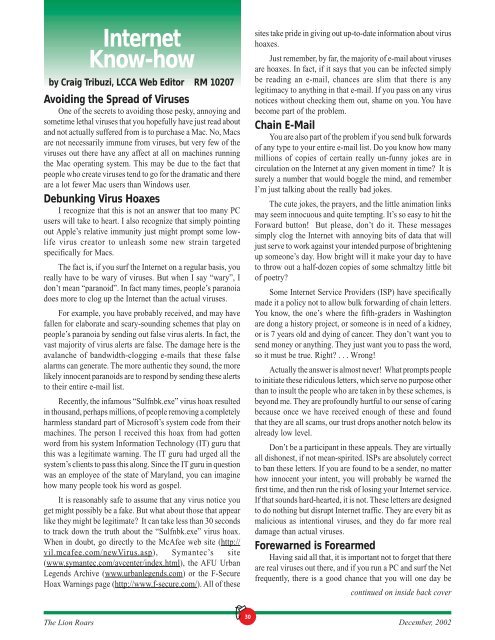Dec 2002 - Lionel Collectors Club of America
Dec 2002 - Lionel Collectors Club of America
Dec 2002 - Lionel Collectors Club of America
Create successful ePaper yourself
Turn your PDF publications into a flip-book with our unique Google optimized e-Paper software.
InternetKnow-howby Craig Tribuzi, LCCA Web Editor RM 10207Avoiding the Spread <strong>of</strong> VirusesOne <strong>of</strong> the secrets to avoiding those pesky, annoying andsometime lethal viruses that you hopefully have just read aboutand not actually suffered from is to purchase a Mac. No, Macsare not necessarily immune from viruses, but very few <strong>of</strong> theviruses out there have any affect at all on machines runningthe Mac operating system. This may be due to the fact thatpeople who create viruses tend to go for the dramatic and thereare a lot fewer Mac users than Windows user.Debunking Virus HoaxesI recognize that this is not an answer that too many PCusers will take to heart. I also recognize that simply pointingout Apple’s relative immunity just might prompt some lowlifevirus creator to unleash some new strain targetedspecifically for Macs.The fact is, if you surf the Internet on a regular basis, youreally have to be wary <strong>of</strong> viruses. But when I say “wary”, Idon’t mean “paranoid”. In fact many times, people’s paranoiadoes more to clog up the Internet than the actual viruses.For example, you have probably received, and may havefallen for elaborate and scary-sounding schemes that play onpeople’s paranoia by sending out false virus alerts. In fact, thevast majority <strong>of</strong> virus alerts are false. The damage here is theavalanche <strong>of</strong> bandwidth-clogging e-mails that these falsealarms can generate. The more authentic they sound, the morelikely innocent paranoids are to respond by sending these alertsto their entire e-mail list.Recently, the infamous “Sulfnbk.exe” virus hoax resultedin thousand, perhaps millions, <strong>of</strong> people removing a completelyharmless standard part <strong>of</strong> Micros<strong>of</strong>t’s system code from theirmachines. The person I received this hoax from had gottenword from his system Information Technology (IT) guru thatthis was a legitimate warning. The IT guru had urged all thesystem’s clients to pass this along. Since the IT guru in questionwas an employee <strong>of</strong> the state <strong>of</strong> Maryland, you can imaginehow many people took his word as gospel.It is reasonably safe to assume that any virus notice youget might possibly be a fake. But what about those that appearlike they might be legitimate? It can take less than 30 secondsto track down the truth about the “Sulfnbk.exe” virus hoax.When in doubt, go directly to the McAfee web site (http://vil.mcafee.com/newVirus.asp), Symantec’s site(www.symantec.com/avcenter/index.html), the AFU UrbanLegends Archive (www.urbanlegends.com) or the F-SecureHoax Warnings page (http://www.f-secure.com/). All <strong>of</strong> thesesites take pride in giving out up-to-date information about virushoaxes.Just remember, by far, the majority <strong>of</strong> e-mail about virusesare hoaxes. In fact, if it says that you can be infected simplybe reading an e-mail, chances are slim that there is anylegitimacy to anything in that e-mail. If you pass on any virusnotices without checking them out, shame on you. You havebecome part <strong>of</strong> the problem.Chain E-MailYou are also part <strong>of</strong> the problem if you send bulk forwards<strong>of</strong> any type to your entire e-mail list. Do you know how manymillions <strong>of</strong> copies <strong>of</strong> certain really un-funny jokes are incirculation on the Internet at any given moment in time? It issurely a number that would boggle the mind, and rememberI’m just talking about the really bad jokes.The cute jokes, the prayers, and the little animation linksmay seem innocuous and quite tempting. It’s so easy to hit theForward button! But please, don’t do it. These messagessimply clog the Internet with annoying bits <strong>of</strong> data that willjust serve to work against your intended purpose <strong>of</strong> brighteningup someone’s day. How bright will it make your day to haveto throw out a half-dozen copies <strong>of</strong> some schmaltzy little bit<strong>of</strong> poetry?Some Internet Service Providers (ISP) have specificallymade it a policy not to allow bulk forwarding <strong>of</strong> chain letters.You know, the one’s where the fifth-graders in Washingtonare dong a history project, or someone is in need <strong>of</strong> a kidney,or is 7 years old and dying <strong>of</strong> cancer. They don’t want you tosend money or anything. They just want you to pass the word,so it must be true. Right? . . . Wrong!Actually the answer is almost never! What prompts peopleto initiate these ridiculous letters, which serve no purpose otherthan to insult the people who are taken in by these schemes, isbeyond me. They are pr<strong>of</strong>oundly hurtful to our sense <strong>of</strong> caringbecause once we have received enough <strong>of</strong> these and foundthat they are all scams, our trust drops another notch below itsalready low level.Don’t be a participant in these appeals. They are virtuallyall dishonest, if not mean-spirited. ISPs are absolutely correctto ban these letters. If you are found to be a sender, no matterhow innocent your intent, you will probably be warned thefirst time, and then run the risk <strong>of</strong> losing your Internet service.If that sounds hard-hearted, it is not. These letters are designedto do nothing but disrupt Internet traffic. They are every bit asmalicious as intentional viruses, and they do far more realdamage than actual viruses.Forewarned is ForearmedHaving said all that, it is important not to forget that thereare real viruses out there, and if you run a PC and surf the Netfrequently, there is a good chance that you will one day becontinued on inside back cover30The Lion Roars <strong>Dec</strong>ember, <strong>2002</strong>
















